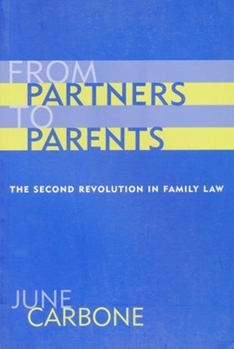From Partners to Parents: The Second Revolution in Family Law
Select Format
Select Condition 
Book Overview
Examining the substantial changes that have occurred in families, family research, and family law over the last twenty years, this volume describes a paradigm shift in the legal and social regulation of the family from an emphasis on partners' relationships with each other to an emphasis on parents' relationships to their children. In this model, custody has replaced fault as the most important determination made at divorce, and marital status is supplanted by financial and emotional maturity as the indicia of responsible parenthood. The most significant remaining challenge, according to June Carbone, is the need to remake the relationship between adults in such a way that it makes fulfillment of their obligations to children possible.
Carbone's broadly interdisciplinary approach, drawing on economics, law, philosophy, and feminism--as well as references to popular culture, from Doonesbury to Grace Under Fire--serves as an intellectual survey of family research and of the major theoretical approaches to the family. She evaluates historical, sociological, and psychological research to show how family change is part of a long-term response to changing industrial organization, and to assess the impact of changing family form on children.Format:Paperback
Language:English
ISBN:0231111177
ISBN13:9780231111171
Release Date:June 2000
Publisher:Columbia University Press
Length:320 Pages
Weight:1.10 lbs.
Dimensions:0.8" x 6.0" x 9.0"
Grade Range:Postsecondary and higher
Customer Reviews
1 rating
excellent overview to the changing family
Published by Thriftbooks.com User , 24 years ago
As an intellectual divorced father, I have long searched for that one book that gave the "view from 60,000" feet of what has changed in the American family, and why family law and social policy is (as schizophrenic) as it is. This is the book.Professor Carbone overviews first the philosophical divide among economists, feminists, and others as to the "driving forces" within marriage, divorce, and post-divorce relationships. She then looks at the empirical evidence of how the family has actually functioned since the 19th century, and how it has changed since the 1960s (especially in the face of abortion, no fault divorce, and changed social mores that made single parenthood permissible). Finally, she discusses the legal revolution that has moved the relationship between parents and children to center stage, as it has removed the relationship between husbands and wives.Professor Carbone's most important service to the family law community is that this is an impartial book - it is neither a militant feminist diatribe about "patriarchy," nor a Christian values diatribe about the "decline of the family," nor a father's rights diatribe about how the system "works against" fathers. Particularly in the fact that she brings to light the work of economic science in explaining the perverse incentives that encourage divorce, she has done the whole community a favor.It is a centrist work that explains the explosion in divorce and single parent families in the changing economic/social structure and the changed legal environment due to abortion-on-demand and no fault divorce. The book has a massive bibliography and does an excellent job summarizing the available scholarly literature, on all sides of the debate.Her central thesis is that the centrality of the "marriage contract" between man and woman has been replaced by the centrality of an irrevocable contract between parent and child. The law now looks to fathers (or the high-earning, non-custodial parent) to guarantee minimum child income; and to mothers (or the low-income, custodial parent) to guarantee food, clothing, and shelter for their children. These responsibilities can be transferred to others (via adoption), or revoked by the state, but they cannot be abrogated by the parties themselves. Child custody thus replaces fault as the central legal and emotional nexus of divorce, and the "no fault" cancel-upon-will nature of marriage is not replicated within the parent/child bond.Marriage is temporary; parenting is forever, sayeth the law.Seen in this context, much of present-day family law makes sense. Spousal support, or "alimony" becomes of greatly decreased relevance, since the marriage contract extends only within the life of the marriage. Community property "makes sense" because of the marriage partnership, and the dissolution of community property becomes more important than alimony...Most importantly, because children now have rights, it "makes se





